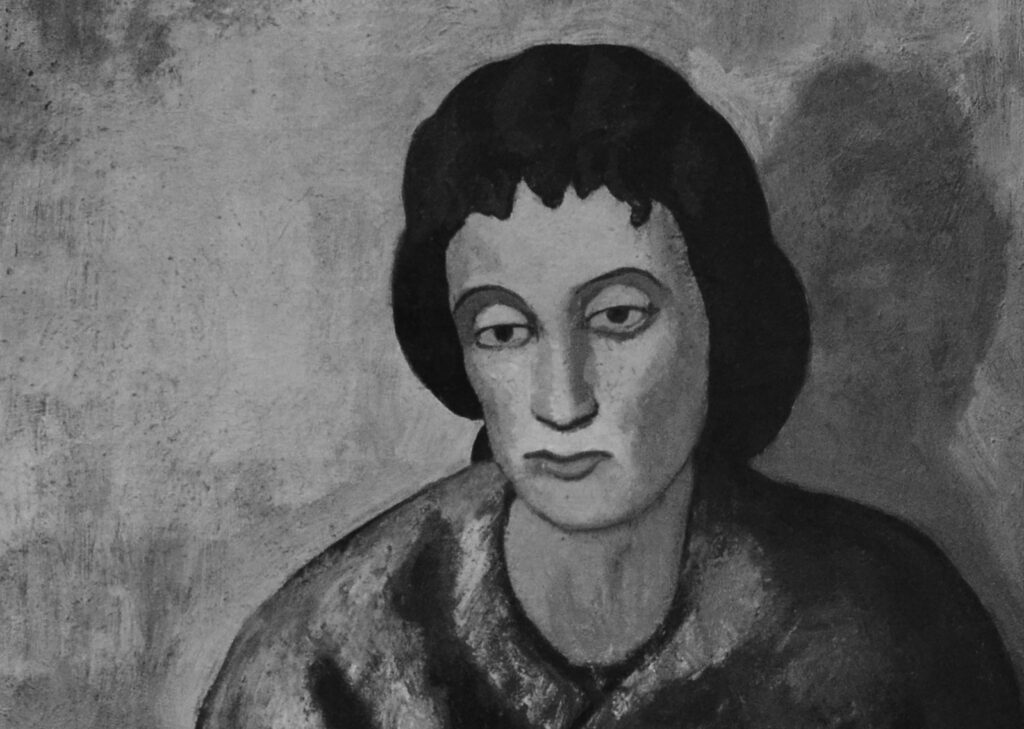Martha Baillie recalls childhood days at Loon Island, north of Toronto: the way she’d wake up early in the morning, scurry into her parents’ bedroom, and jump onto her father’s lap, desperate to be tickled. The same game terrified her sister, Christina, who experienced their father’s teasing as an assault, one that provoked a deep sense of fear. “My father, her father, our father,” Baillie recites, lamenting two realities, diverse but inextricable. Martha and Christina Baillie never saw things the same way.
Baillie’s memoir in essays, There Is No Blue, emerges from a desire to collapse this distance between sister and sister. Written on the heels of Christina’s death, along with the deaths of their mother and father, the book is as much a survivor’s testimony as a homecoming to grief. In the opening essay, Baillie sits quietly by her mom’s sickbed as death takes hold. Once the moment has passed, she calls on an artist friend to construct a death mask. Both mask and essay record the transitional moment from living to non-living body: the uncanny peacefulness, the wordless way the living carry out their assigned roles. “Is it losing my mother that is making me want to lure my father back into the present?” Baillie asks, before turning to thoughts of her father, a once brilliant mathematician. She pulls old letters from a cardboard box and tells us of his boyish escapades as a student in New York City, his sportiveness, the intensity of her love for him, and her desire to claim him as her own: “From him my absentmindedness. From him my short temper. From him my arms and legs, my hands and feet, my dark eyes, and my nose.”
Looking back at the end of a life, one can hardly help but finesse: concretize a lost person’s character, perhaps with a literal plaster mask, or locate some final feeling — I am like my father was. At a death, we are collectors wary of dispersion, gathering the past and shoring up the facts. But Christina’s suicide resists finality, and Martha tussles with its unruliness. “Ever since her death, I’ve been writing, erasing, and rewriting this disobedient tale,” by which she means the story of Christina’s life, her death, and all that happened before it. Throughout There Is No Blue, the sisters occupy many of the same rooms but stand in markedly different realities. They dance across the line between reality and delusion.
Christina, who lived most of her adult life with a schizophrenia diagnosis, frequently found herself outside that “enviable realm” of “mutual comprehensibility.” Her father was lacerating and abusive; Martha’s dad was well-intentioned. Christina’s parents were probably Nazis. Martha’s were not. The sisters’ relationship was often a battle over “whose narration was to win the day, whose telling of the past was to dominate the future.” It culminated at the family home, where Christina had been living since their mother left for long-term care. This was Christina’s sanctuary. Clad in unconventional artworks, it was a container that kept the outside world at bay. But when pressed by lawyers after their mother’s death, Martha suggested they sell the house and divide the profits evenly. The proposition was highly distressing for Christina, who expressed a fervent wish to stay put. The thought of the property’s loss contributed to her decision to end her life.

Confronting a slew of unanswerable questions.
Pablo Picasso, Woman with Bangs (1902–04); Baltimore Museum of Art; Wikimedia Commons
It is not difficult to grasp the enormous impact of Christina’s passing on Martha: the dizzying fear of culpability, the slew of unanswerable questions. She wonders, “When does a desire”— in this case, the wish to stay put —“become a need?” When, if ever, is someone lost to illness? Guilt comes first, but Baillie finds the emotion inadequate in the way it attributes a false resolve to her actions. Guilt is a form of monomania, a means of turning toward herself and away from Christina, avoiding her sister’s pain. It is an impulse to be wary of, like imagining a too firm barrier between madness and sanity or believing you can make sense of another’s life: “I felt certain that the truth about my father and my sister — the only one available to me — had to be of my own making, and that it would never hold still.”
Baillie embraces a free-form ethic, placing her faith in narrative and emotional slippages. Her prose lands between deadpan and lyrical; reading it is like listening to a poet witness giving testimony on the stand. Comprising stories, character sketches, armchair analyses, and serious encounters with memory, the book unfolds in no discernible order. There is an elliptical quality to it, as Baillie revisits conflicts and scenes, re-angling her narrative, posing new questions. Taken together, these fragments are another sort of family home; to read them is to wander in and out of the same rooms, to re-enter old spaces and find new patterns in the wallpaper. “Mother. Language. Body. House.” This is a writerly mantra for Baillie, a cue from Christina, who once described her own stories and poems as “environments, to be entered from any direction.”
Some of the book’s most arresting passages come from Christina’s own archive (she was also a prolific writer and diarist). Christina speaks for herself and in concert with Martha. The author’s decision to include her sister’s words gestures toward Sister Language, a collection of correspondence — a linguistic bridge — co‑created by the Baillies and published in 2019. Like that earlier text, There Is No Blue rehashes the past in search of attunement: places where Christina can be heard, or felt, at such a pitch that, momentarily, their truths converge.
Rachel Gerry is a freelance writer in Toronto.

